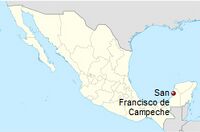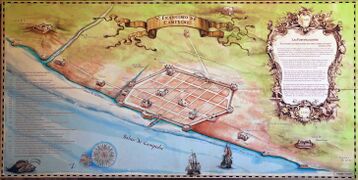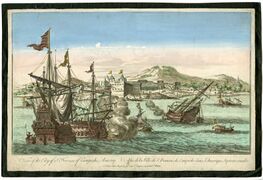Difference between revisions of "Campeche"
(→Locations) |
|||
| Line 14: | Line 14: | ||
=Locations= | =Locations= | ||
| + | ==Fortifications== | ||
| + | The city of Campeche is an example of [[urbanism]] in a baroque colonial city, with a reticular and regular plan, its urban trace, a model of colonial port cities, reflects the main role that it played as a commercial, religious and military connection point characterized by its high level of integrity and homogeneity. More than one thousand buildings with a historic value have survived as witnesses of space and temporal superimposition of several significant historic periods of Mexico. | ||
| + | |||
| + | Due to the constant attacks of both [[England|English]] and [[Netherlands|Dutch]] buccaneers and pirates such as [[Francis Drake]], [[John Hawkins (naval commander)|John Hawkins]], [[Laurens de Graaf]], [[Cornelis Jol]], Jacobo Jackson, Jean Lafitte, Francisco de Grammont, Bartolomé Portugués, William Parker, Francisco Nau, [[Edward Mansvelt]], [[Henry Morgan]], [[Lewis Scot]], [[Roche Braziliano]] and [[Michel de Grammont]] for almost 160 years, in 1686 the government started to fortify the city.<ref name=CAM>Marley, David (2005) ''Historic cities of the Americas: an illustrated encyclopedia, Volume 1'' p.223. ABC-CLIO, 2005</ref> | ||
| + | |||
| + | The [[France|French]] engineer Louis Bouchard de Becour was commissioned to unify all the defensive works that surrounded the city with a wall. At its completion, the wall surrounding the city of Campeche was 2,560 meters in length, forming an irregular hexagon around the main part of the city, with eight defensive bastions on the corners. These bulwarks now serve different functions: | ||
| + | |||
| + | * '''Santiago''': Used as the Botanical Garden 'Xmuch´haltún'. Reconstructed. | ||
| + | * '''San Pedro''': Former prison. | ||
| + | * '''San Francisco''': Protects the Land Gate. Houses the library of the [[INAH]]. | ||
| + | * '''San Juan''': Protects the Land Gate. | ||
| + | * '''Nuestra Señora de la Soledad''': Also protects the Sea Gate. It is the largest one and holds the Museum of City History. | ||
| + | * '''San Carlos''': Holds the City Museum. This fort was the first one built. Protects the Sea Gate. | ||
| + | * '''Santa Rosa'''. | ||
| + | |||
| + | It also contained four gates to allow access to the main quarters. The main entrances are the ''Puerta de la tierra'' ("Land Gate"), built in 1732, and the ''Puerta del mar'' ("Sea Gate"). The Land Gate is kept as a tourist attraction, having a light and sound show three nights each week and keeping original supplies and items from the 17th century. The other gates were Guadalupe and San Román, connecting to the outside [[neighborhoods]]. | ||
| + | |||
| + | Additionally, two main forts protected the city from two nearby hills on each side, the forts of San José el Alto (built in 1762) and San Miguel. These forts gave long-range [[artillery]] coverage and served also as look-outs. They were built before the walls of the city. The fort of San Miguel is used as a museum and houses a collection of pre-Hispanic items. The [[fort]] of San José houses a collection of boats and weapons of the period. | ||
=Timeline= | =Timeline= | ||
Revision as of 20:58, 3 October 2022
| Campeche, Yucatán | ||||||||||||

| ||||||||||||
| ||||||||||||

|
See Wikipedia
St. Francisco de Campeche is a very well established Spanish city designed with an ‘old’ look to it, suiting the aristocratic tastes of its many landowners and wealthy merchants. It is an important crossroads between the east and the lands of New Spain.
Contents
Locations
Fortifications
The city of Campeche is an example of urbanism in a baroque colonial city, with a reticular and regular plan, its urban trace, a model of colonial port cities, reflects the main role that it played as a commercial, religious and military connection point characterized by its high level of integrity and homogeneity. More than one thousand buildings with a historic value have survived as witnesses of space and temporal superimposition of several significant historic periods of Mexico.
Due to the constant attacks of both English and Dutch buccaneers and pirates such as Francis Drake, John Hawkins, Laurens de Graaf, Cornelis Jol, Jacobo Jackson, Jean Lafitte, Francisco de Grammont, Bartolomé Portugués, William Parker, Francisco Nau, Edward Mansvelt, Henry Morgan, Lewis Scot, Roche Braziliano and Michel de Grammont for almost 160 years, in 1686 the government started to fortify the city.<ref name=CAM>Marley, David (2005) Historic cities of the Americas: an illustrated encyclopedia, Volume 1 p.223. ABC-CLIO, 2005</ref>
The French engineer Louis Bouchard de Becour was commissioned to unify all the defensive works that surrounded the city with a wall. At its completion, the wall surrounding the city of Campeche was 2,560 meters in length, forming an irregular hexagon around the main part of the city, with eight defensive bastions on the corners. These bulwarks now serve different functions:
- Santiago: Used as the Botanical Garden 'Xmuch´haltún'. Reconstructed.
- San Pedro: Former prison.
- San Francisco: Protects the Land Gate. Houses the library of the INAH.
- San Juan: Protects the Land Gate.
- Nuestra Señora de la Soledad: Also protects the Sea Gate. It is the largest one and holds the Museum of City History.
- San Carlos: Holds the City Museum. This fort was the first one built. Protects the Sea Gate.
- Santa Rosa.
It also contained four gates to allow access to the main quarters. The main entrances are the Puerta de la tierra ("Land Gate"), built in 1732, and the Puerta del mar ("Sea Gate"). The Land Gate is kept as a tourist attraction, having a light and sound show three nights each week and keeping original supplies and items from the 17th century. The other gates were Guadalupe and San Román, connecting to the outside neighborhoods.
Additionally, two main forts protected the city from two nearby hills on each side, the forts of San José el Alto (built in 1762) and San Miguel. These forts gave long-range artillery coverage and served also as look-outs. They were built before the walls of the city. The fort of San Miguel is used as a museum and houses a collection of pre-Hispanic items. The fort of San José houses a collection of boats and weapons of the period.

